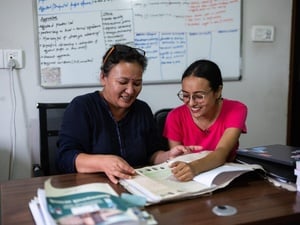Stateless for 20 years, a filmmaker becomes an Uzbek citizen at last

Stateless for 20 years, a filmmaker becomes an Uzbek citizen at last
Ali Choriev sits in his office in central Bukhara and struggles to hold back tears.
“I wasted a lot of time and missed many opportunities. I had a lot of amazing offers. Believe me, you can always find money for bread, but if you don’t have human dignity, a voice, it’s very difficult.”
Throughout his long career, 55-year-old filmmaker had firmly established himself in the local film industry, even rising to become head of the Bukhara branch of Uzbekkino, Uzbekistan’s national film agency. But as a stateless person for over 20 years, the feeling of humiliation never left him.
“I never shared my feelings, this pain, with anyone, even with my family. I didn’t want them to worry about me. But in embassies and at the borders they always treat you like a nobody. You travel back and forth to receive one visa,” Ali says.
“I never shared my feelings, this pain, with anyone, even with my family.”
On 21 April 2017, Ali received a phone call with good news: after decades of statelessness, he would be confirmed as an Uzbekistani citizen. Newly elected in December 2016, Uzbekistan’s President Mirziyoyev had begun to resolve cases of statelessness, based on the existing laws.
Coincidentally, that momentous day he received the phone call was Ali’s birthday. He had turned 52 years old, but with the news of his citizenship, he felt as though he had been re-born.
Since then, Uzbekistan has continued efforts to address statelessness: a new law adopted in 2020 entitles some 50,000 stateless people who had permanent residency in the country before 1 January 1995 to citizenship of Uzbekistan. They are among approximately 97,000 people known to be stateless in the country as of the end of 2019; they constitute one of the largest known stateless populations in the world.
Statelessness in Uzbekistan dates back to the dissolution of the Soviet Union in December 1991, which put the former republics on course to independence. Previously, citizens of the USSR, which stretched from the Baltics to the furthest corners of Central Asia, could travel freely across the vast country. The dissolution in 1991 saw the reinstatement of borders and separate nationalities.
Ali was born in the largely Tajik speaking city of Bukhara. An ethnic Tajik, he moved to Tajikistan in 1980 to study acting and directing. Following his graduation, he worked in the Tajik film industry as a director’s assistant and then as a second director. In 1992, he moved to Moscow to work with an acclaimed director and his newly founded film company. He worked in Russia for the next four years.
At the time, his family had already settled down in Uzbekistan and received Uzbekistani citizenship. Ali joined them only at the end of 1996, after a window to prove a right to citizenship had closed, and thus found himself stateless.
As a filmmaker with projects abroad, Ali needed to travel. He received a grey passport – a travel document issued to stateless people which allows them to cross the borders. Applying for foreign visas was a struggle.
“People were inviting me abroad, I have the ticket, the money, but I cannot go. I have to go to the Russian embassy and apply for a visa. Once a sergeant in Azerbaijan threw the passport in my face. And he was right. He had never seen such a document. I was a person without citizenship,” Ali says.
“You know that I crossed the border of my own country illegally? I travelled through an unofficial crossing with Kazakhstan in 2002. My visa expired and they would have deported me. So I had to go back illegally.”
After returning from each of his foreign trips, Ali had to report back to the Uzbek security services. He had to explain in detail where he was and whom he met. After receiving citizenship, Ali says, the security services have left him in peace.
Not being able to vote was another issue that Ali struggled with. While Uzbekistan has always been his beloved homeland, he could not participate in its political life. But in December 2019, he voted in Uzbekistan’s parliamentary election for the first time in his life.
“I couldn’t sleep the whole night. I woke up early in the morning. It was still dark outside but I couldn’t wait to cast my vote,” Ali says. “I was holding back my tears so that my neighbours don’t see me cry. You’re 54 years old and you go to vote for the first time, like a teenager.”
“It was still dark outside but I couldn’t wait to cast my vote. I was holding back my tears so that my neighbours don’t see me cry.”
After receiving citizenship, Ali travelled with his family to Tajikistan. Visiting a country which during his youth had been his second home was an important symbolic way to celebrate his new status. But that was not the only trip he made.
“I went to Mecca to thank God for my citizenship. Not only for myself, but for all the other people who became citizens: teachers, workers, nurses. There are so many of us,” Ali says. “I don’t want to leave Uzbekistan, I have travelled enough. Now I want to do something for my country. Uzbekistan is my homeland.”









